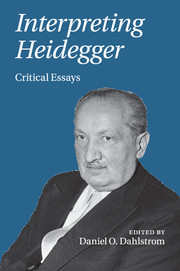Book contents
- Frontmatter
- Contents
- List of contributors
- Acknowledgments
- Method of citation and bibliography of Heidegger's works
- Introduction
- I Interpreting Heidegger's Philosophy
- 1 Heidegger's hermeneutics: towards a new practice of understanding
- 2 Facticity and Ereignis
- 3 The null basis-being of a nullity, or between two nothings: Heidegger's uncanniness
- 4 Heidegger's concept of freedom, 1927–1930
- 5 Ontotheology
- II INTERPRETING HEIDEGGER'S INTERPRETATIONS
- III INTERPRETING HEIDEGGER'S CRITICS
- Index
- References
5 - Ontotheology
Published online by Cambridge University Press: 11 April 2011
- Frontmatter
- Contents
- List of contributors
- Acknowledgments
- Method of citation and bibliography of Heidegger's works
- Introduction
- I Interpreting Heidegger's Philosophy
- 1 Heidegger's hermeneutics: towards a new practice of understanding
- 2 Facticity and Ereignis
- 3 The null basis-being of a nullity, or between two nothings: Heidegger's uncanniness
- 4 Heidegger's concept of freedom, 1927–1930
- 5 Ontotheology
- II INTERPRETING HEIDEGGER'S INTERPRETATIONS
- III INTERPRETING HEIDEGGER'S CRITICS
- Index
- References
Summary
What does Heidegger mean by ontotheology, and why should we care? We will see that Heidegger understands ontotheology as the two-chambered heart of Western metaphysics, “the history that we are” (GA 47: 28/N3 20). Heidegger's deconstruction of the metaphysical tradition leads him to the view that metaphysics does not just concern philosophers isolated in their ivory towers; on the contrary, “metaphysics grounds an age.” As he explains, “Metaphysics grounds an age in that, through a specific interpretation of what is … it gives the age the ground of its essential form.” Here Heidegger advances the thesis I call ontological holism. Put simply: Everything is, so by changing our understanding of what “is-ness” itself is, metaphysics can change our understanding of everything. In other words, metaphysics molds our very sense of what it means for something – anything – to be. Because everything intelligible “is” in some sense, Heidegger holds that: “Western humanity, in all its comportment toward entities, and that means also toward itself, is in every respect sustained and guided by metaphysics” (GA 6.2: 309/N4 205). By shaping and reshaping our understanding of what “is-ness” is, metaphysics plays a foundational role in establishing and maintaining our very sense of the intelligibility of all things, ourselves included.
Heidegger's view that “metaphysics grounds an age” (“ein Zeitalter,” literally “an age of time,” in the singular) presupposes two further theses, which I call ontological historicity and epochality.
- Type
- Chapter
- Information
- Interpreting HeideggerCritical Essays, pp. 106 - 132Publisher: Cambridge University PressPrint publication year: 2011
References
- 1
- Cited by

